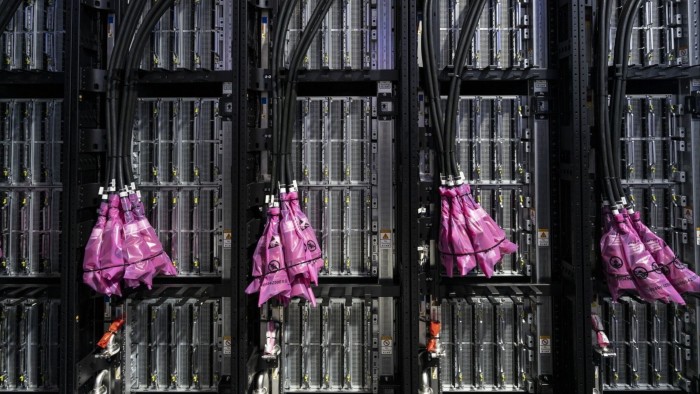Stay informed with free updates
Simply sign up to the US-China relations myFT Digest — delivered directly to your inbox.
China wants the US to ease export controls on a critical component for artificial intelligence chips as part of a trade deal ahead of a possible summit between President Donald Trump and President Xi Jinping.
Chinese officials have told experts in Washington that Beijing wants the Trump administration to relax export restrictions on high-bandwidth memory (HBM) chips, according to several people familiar with the matter.
US Treasury secretary Scott Bessent has led three rounds of trade negotiations with China over the past three months. One person said the Chinese team, headed by vice-premier He Lifeng, had raised the HBM issue in some of those negotiations. The US Treasury declined to comment.
Ahead of an August 12 deadline for the US and China to reach a trade deal and avoid reimposing high tariffs, US commerce secretary Howard Lutnick this week said the administration would probably extend the ceasefire by 90 days.
Beijing has been frustrated at US export controls since President Joe Biden in 2022 unveiled measures to damage Chinese efforts to buy or make advanced AI chips. In 2024, he banned HBM exports to China to hamper Huawei and Semiconductor Manufacturing International Corporation (SMIC), a Chinese chipmaker.
The recent focus on export controls to China has been on the H20 chip Nvidia designed for the Chinese market after Biden banned the export of more advanced chips. The Financial Times reported that the US approved H20 export licences on Friday after Nvidia CEO Jensen Huang met Trump.
But people familiar with the matter said China is much more worried about HBM controls because they seriously constrain the ability of Chinese companies, including Huawei, to develop their own AI chips.
The Chinese push has raised alarm bells in Washington because of signs that Trump is willing to relax export controls to get a summit with Xi.
The FT reported last month that the commerce department has been told to freeze new export controls on China. Some officials are increasingly concerned after Trump in July reversed his earlier ban on H20 sales.
Gregory Allen, an AI expert at the CSIS think-tank, said HBM was critical for making advanced AI chips and compromised about half the value of the chips. “Saying that we should allow more advanced HBM sales to China is the exact same as saying that we should help Huawei make better AI chips so that they can replace Nvidia.”
One person familiar with US government debates on HBM said the Biden administration concluded that export controls on HBM chips would be the “single biggest constraint” on China’s ability to produce AI chips at scale.
“Relaxing these controls would be a gift to Huawei and SMIC and could open the floodgates for China to start making millions of AI chips per year, while also diverting scarce HBM from chips sold in the US,” he said. “This is exactly why China wants the controls revoked, and also why they should not be on the table for negotiation.”
Another person said China also needed HBM to package with the logic component of AI chips that the Chinese firm SophGo obtained in suspected violation of US law from Taiwan’s TSMC. He said HBM was a “big bottleneck” since memory chips were a critical part of AI chips which package together memory and logic chip components.
China’s embassy in the US declined to discuss the HBM issue but said the US was “abusing export controls to suppress China . . . and seriously harming the legitimate rights of Chinese firms”.
As concerns mount in Washington that Trump may relax export controls to get a trade deal, there is fresh scrutiny on Nvidia for selling gaming chips in China that some groups are marketing the chips for AI applications.
Chinese companies are advertising two gaming chips — the 4090D and 5090D — for AI use. Nvidia does not market the chips for AI. The development follows an FT report that smuggling enabled Chinese groups to get $1bn worth of advanced Nvidia AI chips in the second quarter. At the time, Nvidia said: “Trying to cobble together data centres from smuggled products is a losing proposition, both technically and economically”.
John Moolenaar, head of the House of Representatives’ China committee, told the FT that Nvidia and the commerce department’s bureau of industry and security [BIS], which overseas export controls, had to take more action.
“Recent reports have revealed the massive extent of Chinese smuggling of advanced AI chips. We now see China repurposing gaming chips, typically not subject to export controls, to train advanced AI models,” Moolenaar said.
“The scale and brazen openness of this activity make it clear that Commerce’s BIS and Nvidia must do more. Nvidia should strengthen its due diligence on customers, and BIS must step up enforcement.”
Nvidia said the US government had “expressly confirmed that our gaming cards sold in China did not require a licence”. It added: “Our gaming products are designed, manufactured, and marketed for individual gamers and consumers, and sold in compliance with US export control laws.”
Nvidia said retail consumers bought millions of graphics cards every year for gaming, academic, and personal use and that “cannibalising gaming cards is not a viable way to create data centre compute clusters for AI”.
